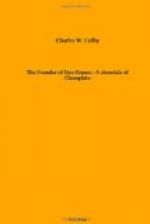The method to be pursued in this book is not that of the critical essay. Nor will these pages give an account of Champlain’s times with reference to ordinances regulating the fur trade, or to the policy of French kings and their ministers towards emigration. Such subjects must be touched on, but here it will be only incidentally. What may be taken to concern us is the spirited action of Champlain’s middle life—the period which lies between his first voyage to the St Lawrence and his return from the land of the Onondagas. Not that he had ended his work in 1616. The unflagging efforts which he continued to put forth on behalf of the starving colony at Quebec demand all praise. But the years during which he was incessantly engaged in exploration show him at the height of his powers, with health still unimpaired by exposure and with a soul that courted the unknown. Moreover, this is the period for which we have his own narrative in fullest detail.
Even were we seeking to set down every known fact regarding Champlain’s early life the task would not be long. Parkman, in referring to his origin, styles him ’a Catholic gentleman,’ with not even a footnote regarding his parentage. [Footnote: It is hard to define Champlain’s social status in a single word. Parkman, besides styling him ‘a Catholic gentleman,’ speaks of him elsewhere as being ‘within the pale of the noblesse.’ On the other hand, the Biographie Saintongeoise says that he came from a family of fishermen. The most important facts would seem to be these. In Champlain’s own marriage contract his father is styled ’Antoine de Champlain, Capitaine de la Marine.’ The same document styles Champlain himself ‘Samuel de Champlain.’ A petition in which he asks for a continuation of his pension (circ. 1630) styles him in its opening words ‘Le Sieur de Champlain’ and afterwards ‘le dit sieur Champlain’ in two places, while in six places it styles him ‘le dit sieur de Champlain.’ Le Jeune calls him ‘Monsieur de Champlain.’ It is clear that he was not a noble. It is also clear that he possessed sufficient social standing to warrant the use of de. On the title-page of all his books after 1604 he is styled the ‘Sieur de Champlain.’] Dionne, in a biography of nearly three hundred pages, does indeed mention the names of his father and mother, but dismisses his first twenty years in twenty lines, which say little more than that he learned letters and religion from the parish priest and a love of the sea from his father. Nor is it easy to enlarge these statements unless one chooses to make guesses as to whether or not Champlain’s parents were Huguenots because he was called Samuel, a favourite name with French Protestants. And this question is not worth discussion, since no one has, or can, cast a doubt upon the sincerity of his own devotion to the Catholic faith.
In short, Champlain by birth was neither a peasant nor a noble, but issued from a middle-class family; and his eyes turned towards the sea because his father was a mariner dwelling in the small seaport of Brouage.




